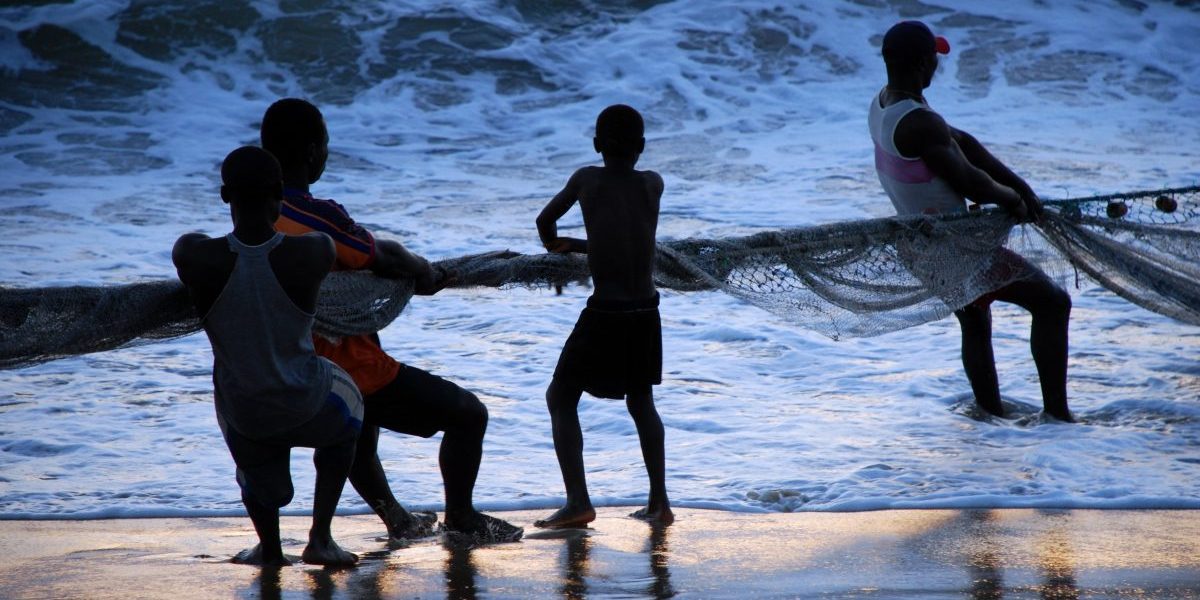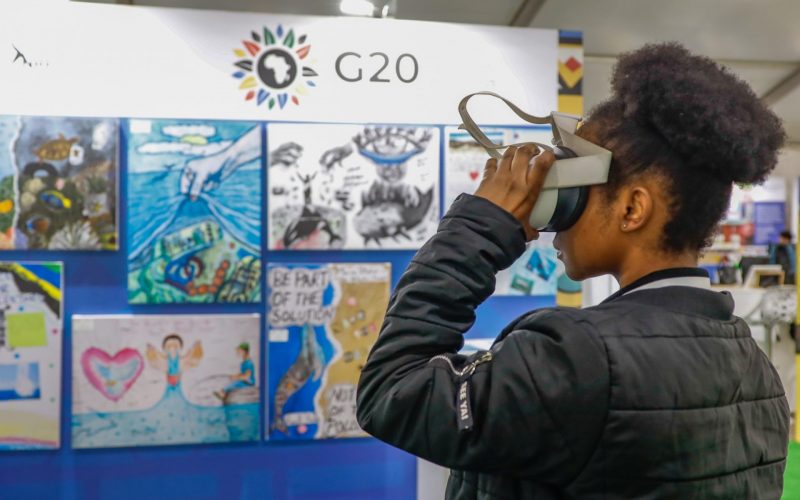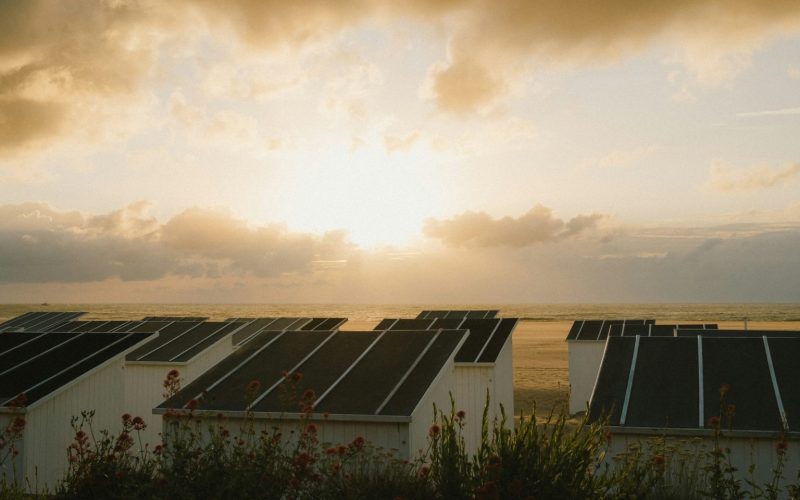Recommendations
- African input: African stakeholders should ensure that the COP28 ocean-climate agenda is developed systematically through deliberations at the Africa Climate Week, meetings of the African Group of Negotiators on Climate Change, and others.
- Integrating Global Stocktake insights: The Global Stocktake has several outputs including a political declaration and a cover decision that could include strong messaging on the oceanclimate nexus.
- Capacity building: Capacity building could bridge the gap between climate and ocean policy communities, and build understanding at national level. Countries could request the Nairobi Work Programme, the Paris Committee on Capacity-Building and other UN bodies, to provide support to bridge this gap.
- Political momentum: It is important to highlight the ocean-climate nexus within a number of relevant policy processes – for example, there are links with seabed mining negotiations, and addressing plastic pollution.
Executive summary
African stakeholders have highlighted the ocean-climate nexus as an important issue for the region and can play a key role in shifting the emphasis from dialogue and negotiation to concrete action. Global and regional forums taking place in the build-up to COP28 should be effectively leveraged by African stakeholders, to drive forward the ocean-climate agenda, showcase the region’s successes and mobilise support for an ambitious ocean-climate agenda.
Introduction
The dictum: ‘ocean health is climate health, and climate health is ocean health,’ is often heard in the corridors of ocean negotiations. This phrase has gained popularity to emphasise the connection between the ocean and climate. The ocean is the world’s largest carbon sink, absorbing carbon dioxide from the atmosphere and contributing to the regulation of the climate system. While the ocean plays a key role in ameliorating climate change, its capacity to do so is not unlimited, and oceans are themselves affected by climate change, making them warmer and more acidic, reducing their oxygen content and causing sea levels to rise.1IPCC, 2019, IPCC Special Report on the Ocean and Cryosphere in a Changing Climate, https://www.ipcc.ch/srocc/ These shifts have a range of secondary impacts on ocean dynamics and ecology, which in turn affect the lives and livelihoods of the people who depend on the ocean.
The link between ocean and climate did not always enjoy full recognition within the UN Framework Convention on Climate Change (UNFCCC) process. The word ‘ocean’ was barely mentioned in the founding document of the UNFCCC, or in the 2015 Paris Agreement that was agreed under the Convention. This led to a group of countries galvanising support for strengthening the emphasis on the ocean-climate nexus.2Second ‘Because The Ocean’ Declaration, (14 November 2016), https://www.becausetheocean.org/second-because-the-oceandeclaration/ This resulted in a series of initiatives and dialogues, including ‘Because the Ocean,’ an initiative by a group of countries committed to including the ocean in their next Nationally Determined Contributions (NDCs).3UNFCC, 2023, Nationally Determined Contributions (NDCs) – The Paris Agreement and NDCs, https://unfccc.int/process-andmeetings/the-paris-agreement/nationally-determined-contributions-ndcs. It was at the 25th UNFCCC Conference of the Parties (COP25) in 2019, under the COP Presidency of Chile, that there was a marked emphasis on the ocean-climate nexus, with many billing it as a ‘blue COP.’4Natalie Sauer, Chile’s ‘Blue Cop’ will push leaders to protect oceans to heal climate, 25.04.2019, https://www.climatechangenews.com/2019/04/25/chiles-blue-cop-will-push-leaders-protect-oceans-heal-climate/
During the ‘lockdown’ years of 2020–21, a virtual Ocean and Climate Change Dialogue took place. The Glasgow Climate Pact that emerged from COP26 under the Presidency of the UK in 2021 included a series of decisions on the oceans-climate nexus, including a commitment to host an annual Ocean and Climate Dialogue, and have different bodies under the Convention include ocean issues within their work plans.5UNFCCC, 2016, Taking the Paris Agreement forward: Tasks arising from decision 1/CP.21, https://unfccc.int/files/bodies/cop/application/pdf/overview_1cp21_tasks_.pdf. In June 2022, the UNFCCC hosted the inaugural Ocean and Climate Change Dialogue at the Bonn Climate Change Conference, but this was towards the close of the conference, with only a half day allocated, and attendance dwindling.
This policy brief seeks to provide recommendations for maintaining the momentum on the ocean-climate nexus in the UNFCCC process, and in a broader context.
2022 – The Ocean Super Year
The year 2022 was billed as the ‘Super Year of the Ocean’.6UNFCCC, 2022, “Blueing” the Paris Agreement at COP27, 27 September 2022. Back-to-back activities created strong momentum that kept the ocean front of mind throughout 2022. The year kicked off with the negotiations on the international legally binding agreement on the conservation and sustainable use of marine biodiversity beyond national jurisdiction. These negotiations were referred to as the ‘biodiversity beyond national jurisdictions’ or ‘BBNJ’ negotiations. These negotiations provided an opportunity to acknowledge the role that the high seas and biodiversity potentially play as a carbon sink, adding to the efforts to combat climate change. The momentum was maintained through the hosting of the Our Ocean Conference7Our Ocean Palau 2022, The 7th Our Ocean Conference. by the island nation of Palau in April 2022.
In June 2022, the UNFCCC hosted the first of the annual Ocean and Climate Change Dialogues. This provided the necessary momentum to keep the ocean-climate nexus a top priority at the second UN Ocean Conference in Lisbon, Portugal later that same month, with several side-events dedicated to this subject. Negotiations on the post-2020 Global Biodiversity Framework under the UN Convention on Biological Diversity followed, where Parties adopted the 30% global marine protection target. It seemed that 2022 was poised to be a pivotal year for addressing the triple crises of ocean, climate and biodiversity.
COP27
With momentum building on from the Ocean and Climate Change Dialogue in June and the UN Ocean Conference in July 2022, excitement grew as to what COP27 would bring for the ocean-climate nexus when it was hosted by Egypt in November 2022. It is important to appreciate the dual worlds that exist at COPs. On one hand, it was the first time that there was an ocean pavilion8Woods Hole Oceanographic Institution and UC San Diego’s Scripps Institution of Oceanography, COP 27 Ocean Pavilion, https://oceanpavilion-cop.org/schedule/. at a COP providing an opportunity to host dedicated side-events on the ocean-climate nexus, with a significant number of side-events on the subjects of nature-based solutions, capacity constraints and other topics. On the other hand, it has to be recognised that there is no dedicated space to discuss the ocean within the formal UNFCCC negotiations. This is a result of the agreement of Parties that there would not be an ocean agenda item, leaving the issue of the ocean-climate nexus at the mercy of the annual appetite of Parties to push this issue, and the COP presidency’s discretion to include it in the cover decision.
COP27 9UN, COP 27, 2022, https://www.un.org/en/climatechange/cop27. seemed a fitting event for progress on the ocean-climate nexus. The venue was also apt as it was hosted at Sharm El-Sheikh in Egypt, and the adjacent Red Sea hosts some of the world’s most magnificent coral reefs. Parties were eager to understand whether the bodies under the UNFCCC had responded to the invitation to include the ocean within their work plan. The updates were sparse, with only the Technology Executive Committee of the Technology Mechanism including the ocean into its work plan. Amidst all the countries’ priorities, a coalition of like-minded countries sought to strengthen the Ocean and Climate Change Dialogue 10UNFCC Secretariat, Ocean and Climate Change Dialogue, UN Climate Change by adding co-facilitators to the process. Two co-facilitators would be selected, with one from a developed country Party and the other from a developing country Party.11UNFCCC, Report of the Conference of the Parties on its twenty-seventh session, held in Sharm el-Sheikh from 6 to 20 November 2022, 17 March 2023. The co-facilitators would be tasked with consulting countries on the topics, structure and format of the Dialogue, as well as supporting the Chair of the subsidiary technical body of the UNFCCC with the selection of topics for the Dialogues.
This role was previously held by the Chair of the subsidiary body and the UNFCCC Secretariat. The introduction of co-facilitators has sought to increase a country-driven and -owned approach to the dialogue. The evolution of the COP27 cover decision, the Sharm el-Sheikh Implementation Plan, was drastic – initial proposals for strong language on the ocean-climate nexus, which included the provision of finance for ocean-climate action, did not make it into the final version of the cover decision, which presented a more process-orientated outcome, agreeing to the introduction of co-facilitators to the Ocean and Climate Change Dialogue.
The general sentiment 12Sarah Palazot, Anaïs Deprez, Loreley Picourt, At COP27 a disappointing outcome despite some progress for the ocean and a long overdue agreement on Loss and Damage, The Ocean and Climate Platform, 20 November 2022, https://ocean-climate.org/en/atcop27-a-disappointing-outcome-despite-some-progress-for-the-ocean-and-a-long-overdue-agreement-on-loss-and-damage/ after COP27 seemed to be disappointment that the ocean-climate nexus had not been strengthened beyond a process orientated element of the Dialogue.
What should we expect in 2023?
In 2022, the pace was set with ambitious language adopted on marine protection at the COP of the Convention on Biological Diversity,13Convention on Biological Diversity, https://www.cbd.int/. and for the conclusion of the ‘agreed text’ of the BBNJ agreement in early 2023 (which was ultimately adopted in June 2023). However, once such agreements are reached, it is up to countries to support their implementation through ratification, domestic action and cooperation. The BBNJ agreement must first be ratified by 60 UN member states before it can enter into force, and increase commitments to protect 30% of Exclusive Economic Zones, and areas beyond national jurisdiction. Nevertheless, it is likely that such conversations will spill over into the UNFCCC COP, possibly restricted to potential topics for the Ocean and Climate Dialogue, or to side events.
Although 2023 does not have the same ‘super year’ status as 2022, there have been several ocean-related conferences hosted, including the World Ocean Summit (February 2023), the Our Ocean Conference (March 2023) and the UNFCCC’s Ocean and Climate Dialogue (June 2023). These events helped build some momentum 14Martin Koehring, World Ocean Summit 2023: Six key takeaways from a remarkable ocean week, Economist Impact, 16 March 2023, https://impact.economist.com/ocean/sustainable-ocean-economy/world-ocean-summit-2023-six-key-takeaways-from-aremarkable-ocean-week. for the ocean agenda at the upcoming COP28. Such conferences are used as platforms to make political commitments, launch initiatives and share experiences. This helps to maintain interest and momentum in the ocean agenda at a political level but fails to provide a framework to track the delivery of such commitments and their impact. This makes them subject to being described as ‘talk shops.’
UNFCCC COP 28 presents a further opportunity to strengthen the ocean-climate nexus within the UNFCCC. This will require the ocean-climate community to start early engagement with the COP28 Presidency, and for like-minded countries to work together towards an impactful Ocean and Climate Change Dialogue, to ensure that the oceanclimate nexus is emphasised as part of the framework for the Global Goal on Adaptation and the first Global Stocktake.
Africa and the ocean-climate nexus
Africa has prioritised the ocean and climate nexus through various policy frameworks, including the African Union’s Blue Economy Strategy (October 2019) and the African Union Climate Change and Resilient and Development Strategy and Action Plan for 2022–2032. These continental policy frameworks specifically call for climate resilient economies and communities. They place significant focus on nature-based solutions, including the role of coastal wetlands in the sequestration and absorption of carbon as a means to combat climate change, as well as serving to protect against storm damage and support biodiversity and fisheries. In the African Group of Negotiators’ (AGN) submission to the UNFCCC, Zambia highlights the need to improve understanding of the science around the ocean-climate nexus, as synthesised in the IPCC’s Special Report on the Ocean and Cryosphere on a Changing Climate and its implications for the continent. The AGN stated that the growing coastal population has a high dependence on fish as a protein source, and there is a growing need to explore opportunities, such as aquaculture and mariculture. The AGN also highlighted the importance of the protection of coastal and marine resources for local communities.
The strength of the ocean-climate nexus in the UNFCCC is the result of collaboration between and within cross-regional and cross-negotiating groups. The AGN, represented by Gambia in the coordinating group, strongly advocates for the region. The Ocean and Climate Change Dialogue is an opportunity that the AGN should capitalize on especially as the topics for this dialogue – coastal ecosystem restoration and fisheries and food securityalign with the high-level priorities of Africa. There has been a general call to improve the Ocean and Climate Change Dialogue by shifting its focus to implementation. Based on the submission by the AGN, the group can push for the Dialogue to move from a platform for knowledge sharing, to one focused on propelling action. The AGN has highlighted the need to understand knowledge gaps in the oceans-climate nexus, and move to policy solutions and implementation. This includes improving the availability and accessibility of finance, an emphasis on capacity-building, and supporting technology transfer for ocean-climate action.
The AGN has an opportunity to effectively participate in the Ocean and Climate Change Dialogue by sharing regional challenges and best practices and calling for more effective support for the implementation of ocean-climate action. African countries are already leading on marine and coastal ecosystem-based adaptation, including the implementation of the world’s first debt-for-nature swap for ocean conservation and climate adaptation in Seychelles,15Economist Impact, April 8 2020, Seychelles swaps debt for nature, https://ocean.economist.com/blue-finance/articles/seychellesswaps-debt-for-nature. the establishment of the African-led Great Blue Wall initiative16The Great Blue Wall Challenge ‘led by Western Indian Ocean countries, with support from IUCN and a coalition of partners, is a bold vision to conserve, protect and restore 2 million hectares of ocean and coastal ecosystems by 2030 while unlocking the development of a regenerative blue economy for the people and the planet. Innovations are required to enable the regeneration of the WIO while creating economic opportunity for the 70 million people dependent on these ecosystems.’ https://uplink.weforum.org/uplink/s/uplink-issue/a002o0000174OowAAE/great-blue-wall-challenge?activeTab=Challenge-About., and receiving one of the first ocean-climate projects funded by the Green Climate Fund. Showcasing such successes can foster opportunities for greater collaboration and lesson sharing with other countries.
Additionally, there are multiple opportunities to systematically ensure that the ocean-climate agenda remains a priority with the African stakeholders by including its consideration in coordination meetings, in opening and closing statements, and as part of the agenda for other meetings including the Africa Climate Summit and the Africa Climate Week scheduled for September 2023 in Nairobi, Kenya and the Marine Regions Forum, to be hosted in November 2023 in Dar es Salaam, Tanzania.
Additionally, there are multiple opportunities to systematically ensure that the ocean-climate agenda remains a priority with the African stakeholders by including its consideration in coordination meetings, in opening and closing statements, and as part of the agenda for other meetings including the Africa Climate Summit and the Africa Climate Week scheduled for September 2023 in Nairobi, Kenya and the Marine Regions Forum, to be hosted in November 2023 in Dar es Salaam, Tanzania.
However, these are only short-term wins to support momentum building; in the longterm, the process of revising NDCs to include ambitious ocean-climate action, provides an avenue for national implementation of the regional aspirations of the continent. With 38 coastal and island states, Africa has the opportunity to emerge as the region that is leading ambitious and bold ocean-climate action for both mitigation and adaptation.
Acknowledgement
SAIIA gratefully acknowledges the support of Swedish International Development Cooperation Agency for this publication.








